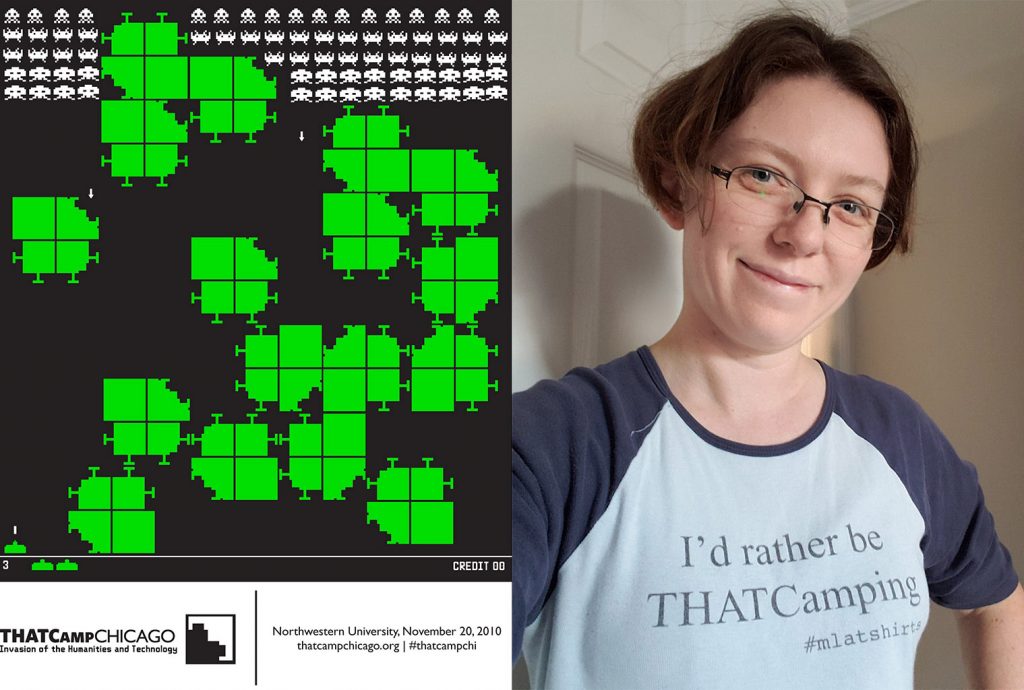My first THATCamp memory is the poster for THATCamp Chicago in 2010. I downloaded it immediately and set to work adding Space Invaders. I couldn’t resist.
That meeting, which brought in folks from all over the Midwest to experience the THATCamp phenomenon sweeping the east coast, came at a strange moment for me. Project Bamboo, the Mellon-funded DH cyber infrastructure initiative I’d been working on since 2008, had just been funded for its technical development phase. But instead of being excited, I bristled at the direction it was taking: big on the cyberinfrastructure, small on the things humanists had said they wanted during our planning phase.
I was 25. I lived in a city that was too cold in the winter and too steamy in the summer to lure me outside and away from my laptop. I was married to a PhD student but having kids was filed away under “long-term plans”. I was ready to take on the world and single-handedly do the things that my million-dollar cyberinfrastructure project had let drop, during my nights and weekends, because someone needed to do it.
If you had asked me then, I wouldn’t have seen a connection between the politics of the time and THATCamp but looking back, it’s hard to miss. It was two years into Obama’s first term, and while the “hope and change” wasn’t necessarily working out as planned, the rhetoric of “yes, we can” still resonated. THATCamp was like that.
I met Ryan Cordell at THATCamp Chicago, and a session on DH directories was the genesis of DHCommons, our answer to the need for a collaborator / project matching portal. I made a mostly-functional version that night, showing up the next morning with a prototype in hand.
Before long, we’d written an MOU with centerNet (drafted with help from such Google searches as “organization MOU example”), we were planning a pre-convention workshop for MLA 2012, we were pitching DHCommons to scholars at small liberal arts colleges as a “virtual DH center” at THATCamp LAC that Ryan hosted at St. Norbert’s College in the summer of 2011. MLA 2012 was the year that DH Twitter went wild over #mlatshirts. One of the ones I had printed — and actually wore — to the conference read “I’d rather be THATCamping.” THATCamp felt magical, a space where anything could be doable if we worked together.
DHCommons didn’t live up to my dreams. Neither did hope and change. The heady “yes, we can” was dampened by “no, we shouldn’t”. Today, we think more about how few of the things dear to us we can save, and less about what we can just make! Tonight! Sustainability actually won’t work itself out. Volunteers get burned out. Magic doesn’t scale.
I still have that “I’d rather be THATCamping” shirt. I live in California now, with three kids 6-and-under, and I wear as a layer under one of the colorful hoodies I’ve sewn myself. It’s what passes for winter wear around here. The phenomenon that was THATCamp is hard to explain — any attempt that comes to mind sounds kind of silly now. Even the idea of being able to go spend a whole weekend off somewhere just spinning up new projects with like-minded grownups feels more like a fairytale than something I used to do. But every time I grab that shirt from my drawer, a flash of memory takes me back to a time when it was revolutionary and empowering and intoxicating to be there — a Slavic PhD drop-out, now an anonymous face of Central IT at work — building the future together. We didn’t have the words then, but anticipating Hamilton, “Look around, look around, at how lucky we are to be alive right now.” It makes me smile for a moment. Then I grab a sweatshirt and head out to face 2020.




